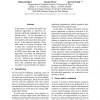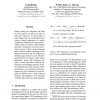EMNLP
2009
13 years 9 months ago
2009
In this work, we propose two extensions of standard word lexicons in statistical machine translation: A discriminative word lexicon that uses sentence-level source information to ...
EMNLP
2009
13 years 9 months ago
2009
We have designed, implemented and evaluated an end-to-end system spellchecking and autocorrection system that does not require any manually annotated training data. The World Wide...
EMNLP
2009
13 years 9 months ago
2009
In this paper, we provide descriptive and empirical approaches to effectively extracting underlying dependencies among parsing errors. In the descriptive approach, we define some ...
EMNLP
2009
13 years 9 months ago
2009
Mitchell et al. (2008) demonstrated that corpus-extracted models of semantic knowledge can predict neural activation patterns recorded using fMRI. This could be a very powerful te...
EMNLP
2009
13 years 9 months ago
2009
Polarity lexicons have been a valuable resource for sentiment analysis and opinion mining. There are a number of such lexical resources available, but it is often suboptimal to us...
EMNLP
2009
13 years 9 months ago
2009
We propose a novel unsupervised approach for distinguishing literal and non-literal use of idiomatic expressions. Our model combines an unsupervised and a supervised classifier. T...
EMNLP
2009
13 years 9 months ago
2009
Current system combination methods usually use confusion networks to find consensus translations among different systems. Requiring one-to-one mappings between the words in candid...
EMNLP
2009
13 years 9 months ago
2009
Jointly parsing two languages has been shown to improve accuracies on either or both sides. However, its search space is much bigger than the monolingual case, forcing existing ap...
EMNLP
2009
13 years 9 months ago
2009
This paper addresses the issue of extracting contexts and answers of questions from post discussion of online forums. We propose a novel and unified model by customizing the struc...
EMNLP
2009
13 years 9 months ago
2009
Many named entities contain other named entities inside them. Despite this fact, the field of named entity recognition has almost entirely ignored nested named entity recognition,...


